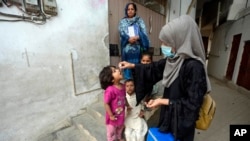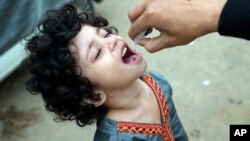Pakistan launched a week-long nationwide polio vaccination campaign Monday, as the country remains one of only two around the world where the paralyzing virus still exists.
This year, so far, Pakistan has reported five cases of the highly infectious disease. The latest polio eradication campaign will target more than 44 million children across much of the country, as well as in Pakistani-administered Kashmir.
The South Asian nation came close to eradicating polio in 2021 when it reported only one case of paralysis from the virus. However, last year the country saw a spike with 20 cases on the record. The virus generally spreads through the fecal matter of a carrier that has contaminated the water supply.
Two of this year’s five cases were detected in the country’s most populous city Karachi in the southern province of Sindh. This came after the city recorded zero cases in the last two years.
A spokesperson of the provincial Emergency Operation Center, Syed Nofil Naqvi, told VOA both cases are children from Afghan families settled in Pakistan for years.
Naqvi blamed cross-border movement between Pakistan and Afghanistan for the disease. Afghanistan, the only other country fighting to eliminate the virus has reported six cases so far in 2023.
“The environmental samples found across Pakistan are genetically linked to Afghanistan,” Naqvi said.
To counter the spread of the virus through travelers, Naqvi said, polio teams vaccinate children at bus stops and other transit points.
All of Pakistan’s remaining polio cases this year came from Bannu, a town in the northern province of Khyber Pakhtunkhwa. Muhammad Zeeshan Khan, deputy coordinator for the provincial Emergency Operation Center, told VOA all three families had refused to vaccinate their children.
“We tried a lot to convince them. One child’s family agreed to giving polio drops but the child had not received an [initial] injection [to build immunity]. This [refusal] is the reason that all three children succumbed to paralysis.” Khan said the families worried the vaccine might harm their children.
Parents’ refusal to give the oral polio vaccine to their children is one of the primary reasons polio virus still exists in Pakistan.
Polio workers and the security personnel protecting them frequently come under lethal attacks from parents and militants who see the vaccination drive as part of a foreign conspiracy to render Pakistani children impotent or to give them ingredients not permissible for Muslims to consume.
Provincial officials in Khyber Pakhtunkhwa recorded more than 16,000 refusals in October. According to Khan, Peshawar, the provincial capital, recorded nearly 8000 refusals followed by Bannu, and North Waziristan where most of Pakistan’s polio cases were recorded last year.
Khyber Pakhtunkhwa recorded 14 incidents of violence against polio teams this year.
To counter such misconceptions, authorities have been engaging local clerics and influencers, and running expensive TV and radio campaigns to convince parents to vaccinate their children.
Still, other parents refuse and bargain for unmet civic needs. The National Emergency Operation Center’s plans for the latest campaign show several communities in Khyber Pakhtunkhwa have refused to vaccinate their children until gas, roads or teachers are provided.
“For us, the biggest concern is the child whose family has refused [to vaccinate],” said Khan.
In any campaign cycle thousands of children are also “missed” because they are not home, or the family is unwilling to allow the vaccination team inside if a male member of the household is not present.
Data shows over 13 percent of children in Quetta, Baluchistan’s provincial capital, missed getting the vaccine last time. In Khyber Pakhtunkhwa, nearly 1.2 percent of children or more than 90,000 were missed as well.
However, Khan said many of the missed children get vaccinated as guests in whichever community they are temporarily present.
In Quetta too, nearly half the children who were missed at one point were eventually covered, according to data.
Still, in parts of Khyber Pakhtunkhwa and Balochistan that border Afghanistan the vaccination campaign will either be conducted later or postponed indefinitely, primarily due to security reasons.
As hundreds of thousands of polio workers and security personnel go door to door this week in areas facing a high risk of polio, Naqvi is hopeful Pakistan will get closer to eliminating the crippling disease.
“We are using a positive way of giving the message,” Naqvi said. From posting signs that said “Caution! Your area has polio,” he said, we now say, “we can eliminate polio.”
A previous version of this story included an incorrect figure for the number of children being targeted by the campaign. Pakistan is hoping to vaccinate more than 40 million children.





